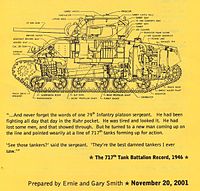79th Infantry Division (United States)
|
79th Infantry Division |
|
|---|---|
 Division badge |
|
| Lineup | 1917 |
| Country |
|
| Armed forces | United States Armed Forces |
| Armed forces | United States Army |
| Branch of service | infantry |
| Type | Infantry division |
| Nickname | Cross of Lorraine |
| Butcher | Second World War |
The 79th Infantry Division ( German 79th US Infantry Division ) was a large unit of the US Army .
history
First World War
The division was formed in August 1917 at Fort George G. Meade , Maryland . In July 1918 she came to France as one of the units of the American Expeditionary Forces . There she was involved in the Meuse-Argonne offensive , from which the division's nickname, Cross of Lorraine , results. Probably the last to die in World War I, Private Henry Nicholas Gunther , comes from the ranks of the division. He was killed on November 11, 1918 while trying to storm a German machine-gun nest. A total of 1151 soldiers of the division died during the war, while 5723 were wounded. The association returned to the United States in May 1919 before being deactivated there in June.
Second World War

On June 15, 1942, the division was reorganized in Fort Pickett, Virginia . In April 1944 she came to Liverpool , Great Britain . After further training in England, the 79th Infantry Division came to France via Utah Beach on June 12 , followed by fighting at Valognes and Cherbourg on June 19 . The division under Major General Ira T. Wyche belonged to the VII Corps . During heavy fighting in the Battle of Cherbourg , the Fort du Roule and the entire city could be conquered at the end of June. After the division had to go on the defensive against the German opponents at the beginning of July, La Haye-du-Puits was taken on July 8 in a house-to-house battle. After the capture of Lessay , where there was also an airfield of the Air Force , the Sarthe was crossed. On August 8th, Le Mans could be conquered largely undestroyed. After fierce fighting for the Allied bridgehead on the Seine , the division came as part of the XV. Corps in the east of France. There the small town of Charmes was liberated on September 12th after house-to-house fighting before the Moselle was crossed. Fighting followed in the Meurthe-et-Moselle department until October . After fighting for Emberménil, the 79th Infantry Division was withdrawn from the front for refreshment on October 24th.
The division was then in Lunéville , before it was used again on November 13 at the front. Fighting at Hagenau and the Westwall followed from December to early January . During defensive battles against the Nordwind company , the division was also involved in heavy fighting near Hatten and Rittershoffen . A position at the Moder was held until February 6th . As part of the 9th US Army ( XVI. Corps ), the division then advanced further into the interior of the German Reich . On March 24th, the Rhine and a little later the Rhine-Herne Canal were crossed. It was here that the 750 men of the 717th Tank Battalion of the US Army were used for the first time in Operation Plunder .
This was followed by participation in the Ruhrkessel . By the end of the fighting in Europe on May 8, 2,476 soldiers of the division had died and 10,971 were wounded. Three soldiers received the Medal of Honor for their services in combat , and numerous others were also honored.
After the end of the war, individual divisional units were relocated to Bavaria and western Czechoslovakia for occupation tasks. On December 10, 1945, the division was relocated to the USA and the division was dissolved on December 20.
post war period
In November 1946, a reserve association was set up, continuing the tradition of the 79th Infantry Division. It still exists today as the 79th Sustainment Support Command , which provides support to other associations.
Division commanders
- Major General Joseph Ernest Kuhn , August 25, 1917 - June 1919
- Brigadier General WJ Nicholson, (Deputy) November 1917 - February 1918, June - December 1918
- Major General Ira T. Wyche , June 1942 - May 1945
- Brigadier General LeRoy H. Watson, May-July 1945
- Major General Anthony C. McAuliffe , (Deputy) July-August 1945
- Brigadier General LeRoy H. Watson, August-December 1945
Web links
- US Army Center of Military History: Order of Battle of the US Army - WWII - ETO 79th INFANTRY DIVISION (accessed June 9, 2018)
- The Cross Of Lorraine: A Combat History Of The 79th Infantry Division
- The 79th Infantry Division at Combat Reels
Individual evidence
- ↑ Special Unit Designations
- ↑ Persico (lit.), p. 135
- ↑ United States Army: 717th Tank Battalion record . In: World War Regimental Histories . January 1, 1946 ( me.us [accessed June 10, 2020]).
- ↑ US Army Reserve
